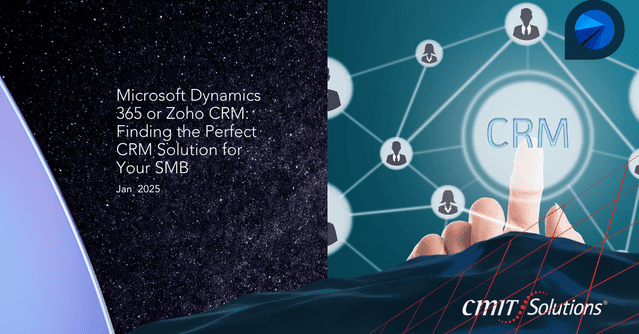For small and medium-sized businesses (SMBs), choosing the right Customer Relationship Management (CRM) system is crucial. Effective CRM solutions not only streamline operations but also enhance customer engagement, drive sales, and simplify marketing efforts. Among the leading CRM platforms, Microsoft Dynamics 365 and Zoho stand out. This comparison evaluates their features, pricing, integrations, and suitability for SMBs, helping businesses in Charleston make informed decisions.
CRM systems like Microsoft Dynamics 365 and Zoho simplify administrative tasks, enabling companies to focus on building customer relationships. By leveraging CRM solutions alongside streamlined IT services, businesses can achieve greater efficiency and customer satisfaction.
What is Microsoft Dynamics 365?
Microsoft Dynamics 365 is an all-encompassing, cloud-based CRM platform. Designed to unify customer data and provide actionable insights, it enables businesses to improve customer engagement, automate processes, and build agility. Its seamless integration with other Microsoft tools like Outlook, Excel, and Teams enhances collaboration.
First introduced in 2016 as a successor to Microsoft Dynamics CRM, Dynamics 365 combines enterprise-grade capabilities with user-friendly features. This robust solution is particularly appealing for businesses seeking a platform that evolves with their needs.
What is Zoho CRM?
Zoho CRM is a versatile, cloud-based platform tailored for sales, marketing, and customer support. Offering tools for both B2B and B2C strategies, Zoho CRM is popular among SMBs due to its affordability and diverse feature set. The platform’s mobile accessibility further supports businesses seeking flexibility in customer relationship management.
Zoho’s appeal lies in its essential CRM functionalities paired with tools like email marketing, marketing automation, and social CRM. While suitable for businesses of all sizes, Zoho’s cost-effective options make it a favored choice for SMBs in Charleston.
Key Features of Microsoft Dynamics 365 CRM
1. Customer Data Management
Dynamics 365 offers a centralized database for managing customer information, including contact details, preferences, and communication history. This comprehensive view supports personalized interactions and enhances customer understanding. For Charleston businesses focused on data protection, the platform’s robust security measures are a significant advantage.
2. Sales Automation
The platform automates lead management, opportunity tracking, and quote generation, enabling sales teams to focus on closing deals. By prioritizing leads and offering valuable insights, Dynamics 365 enhances sales performance—a key aspect for SMBs leveraging proactive IT support.
3. Marketing Automation
From targeted campaigns to engagement tracking, Dynamics 365 simplifies marketing processes. Its advanced tools help SMBs in Charleston maximize ROI through efficient resource allocation. By integrating with productivity applications, marketing teams can boost efficiency.
4. Customer Service Management
With AI-driven chatbots and detailed client histories, Dynamics 365 streamlines customer support. For Charleston SMBs prioritizing incident response planning, this feature ensures timely resolutions and improved customer satisfaction.
5. Field Service Management
For businesses requiring on-site service, Dynamics 365 optimizes technician scheduling, dispatching, and monitoring. By integrating with network security solutions, it ensures secure and efficient operations.
Key Features of Zoho CRM
1. Salesforce Automation
Zoho CRM automates key sales processes like lead management, opportunity tracking, and sales forecasting. While its functionality meets basic requirements, Charleston SMBs seeking comprehensive IT services may find Dynamics 365’s capabilities more robust.
2. Marketing Automation
Zoho’s marketing tools include customer segmentation, lead nurturing, and event management. Its integration with Google Ads provides additional insights, enabling SMBs to measure campaign effectiveness. For businesses leveraging cloud solutions, Zoho’s flexibility is an advantage.
3. Analytics and Reporting
Zoho CRM’s dashboards and customizable reports offer actionable insights, supporting informed decision-making. By integrating with AI-driven tools, SMBs can further enhance strategic planning.
4. Omnichannel Engagement
With support for email, phone, live chat, and social media, Zoho CRM ensures seamless customer interactions. This feature aligns well with Charleston businesses focusing on collaboration tools for remote teams.
Pricing Comparison
Microsoft Dynamics 365
- Sales Professional: $65/user/month—ideal for SMBs needing basic features.
- Sales Enterprise: $105/user/month—includes AI-driven insights and advanced reporting.
- Sales Premium: $150/user/month—adds performance management and analytics tools.
Dynamics 365’s pricing reflects its robust capabilities, making it a valuable investment for SMBs seeking managed IT services.
Zoho CRM
- Free Plan: For up to three users.
- Standard Plan: $12/user/month—covers basic sales and marketing features.
- Enterprise Plan: $100/user/month—includes premium functionalities and advanced support.
Zoho’s affordability makes it appealing to startups. However, businesses requiring custom IT solutions may prefer Dynamics 365.
Customization and Integrations
Microsoft Dynamics 365
Dynamics 365 integrates seamlessly with Microsoft tools like Outlook, SharePoint, and Teams. It also supports third-party applications, ensuring flexibility for Charleston businesses. By pairing with hybrid cloud solutions, SMBs can enhance scalability.
Customization options are extensive, allowing businesses to tailor workflows to their specific needs. Providers like CMIT Charleston offer expert guidance for optimal implementation.
Zoho CRM
While Zoho offers basic customization, its options are less extensive than Dynamics 365. Integration with tools like Google Workspace supports workflow automation, but businesses requiring advanced IT support may face limitations.
Conclusion
For SMBs in Charleston, both Microsoft Dynamics 365 and Zoho CRM offer valuable features. Zoho stands out for its affordability and basic functionalities, making it suitable for startups and cost-conscious businesses. However, for companies seeking comprehensive capabilities, advanced analytics, and seamless integrations, Microsoft Dynamics 365 is the clear choice.
By partnering with CMIT Solutions of Charleston, businesses can ensure smooth CRM implementation, robust security, and ongoing support. Contact us today to learn how our expertise can transform your customer relationship management strategy.





